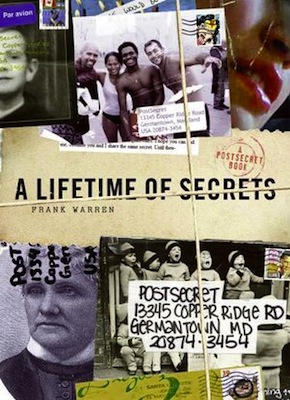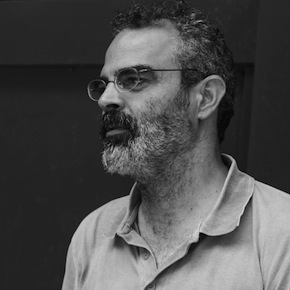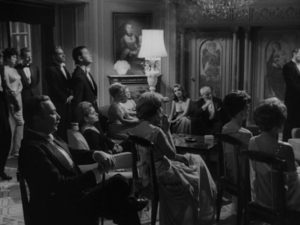Coming in and going out
by Gonçalo M. TavaresPlague diary, 29 March 2020.
I’m reading about one of the biggest icebergs in history, “a tabular iceberg” in Antarctica, which was “more than 31,000 km2”.
“Significantly larger than Belgium,” they add.
I read that another giant iceberg, a sort of island 61 metres thick, “took seventeen years to be mapped.”
I start studying bunkers, the history, types of bunker.
I also want to study animals to understand habits and instincts.
In the garden opposite, the sun seems to be making unacceptable invitations.
How is it possible that the landscape can be a trap, even with no wolves or tigers – and no earthquakes at all.
Interview with the Spanish philosopher Emilio Lledó in El País.
He talks about this “danger we can’t hear.”
He says he doesn’t consider himself a lighthouse for society, merely “a little candle without much wax.”
He is 92.
He leaves the house to go buy bread.
He sees that some preserves no longer exist at the nearby grocer’s.
A policeman carries an old lady’s shopping bags so that she can get off the street faster. In the two bags: vegetables of the day, fruit, biscuits, jelly, chocolate and chocolate. ‘Isn’t that a bit much?’ asks the policeman laughing.”
 In Spain today 838 people died.
In Spain today 838 people died.
A small candle without much wax.
I leaf through A Lifetime of Secrets by Frank Warren.
Postcards with secrets.
“I’ve stopped believing in God since you divorced dad.”
Make a list – stopping believing in God because.
And another list.
I started believing in God because.
Interviewing people, drawing conclusions.
Average reasons, extreme reasons.
Crazy reasons.
Letting go or grabbing hold of what is strong.
The moment when you let go of or grab hold of God.
Reasons for grabbing hold and reasons for letting go.
And then – the time between one thing and another.
Lledó says: we must be alert so that nobody takes advantage of this virus “to spread more obscenity.”
My dogs Roma and Jeri are playing in the garden.
Those really are their names.
Names of cities.
Roma, the Bern Shepherd, not Belgian, who looks like a bear, has some health problems.
She is one.
She now has a nasty-looking swelling in the area around her elbow.
Lledó says, “we are facing the unexperienced.”
Another secret postcard:
“My wife loves me. After 25 years, I have finally realized that this is the only reason I love her.”
And in the next line:
“It’s not enough reason to stay and not enough reason to leave.”
All very clear.
A postcard with a plain background, with no design, the words stand out.
In Italy today 759 people died, 19 in Portugal.
They are talking about peaks and plateaux.
“Iranian authorities are looking for 54 inmates on the run.”
Some humans are still wanting what they wanted in the last century.
“The virus is very intelligent.”
A policeman carries an old lady’s shopping bags so that she can get off the street faster.
In the two bags: vegetables of the day, fruit, biscuits, jelly, chocolate and chocolate.
“Isn’t that a bit much?” asks the policeman laughing.
“Lisbon’s City Hall transforms National Swimming Club into a reception centre for the homeless.”
I am imagining an empty swimming pool now occupied by people who came from the air.
The men who live in the air are now occupying the lanes of the empty swimming pool.
Lane number 1, lane number 2, lane number 3.
France 292 dead, Greece only 6.
The air is an enemy to the home, homes are an enemy to the air. In 2020.
“Baby under one year old infected with the novel coronavirus dies in the US.”
Sunday, phone call to the vet.
He didn’t answer.
Tomorrow is Monday.
Ceremonies for coming into the house and going out.
Van Gennep, I recommend him.
When Jews pass through the front door of the house they touch “with one finger of their right hand the mezuzah, a little case fixed to the doorpost” containing a piece of paper or a “strip of cloth, on which is written or embroidered the holy name of God.”
General guidelines, Wikipedia.
“The mezuzah should be attached to the right-hand side of the doorframe of each Jewish home, synagogue or establishment as a reminder of the Creator.”
General guidelines:
“It should be placed seven hand-spans up from the ground, with its upper end pointing into the establishment.”
Then they kiss their finger and say:
“The Lord preserve your going out and your coming in from this time forth, and even for evermore.”
Thinking about rituals of coming in and going out.
Boots out, boots in.
A porn site is advertising new movies whose protagonists are wearing face masks.
A neighbour is playing the harmonica.
Hilda Churchill was born in 1911 and died in 2020 of coronavirus.
108 years old.
Song: And life will get better, and life will get better is playing in the courtyard.
The World Health Organization is recommending exercise and maybe also dancing.
How do you get your hands to reach your feet without cheating.
Adopting a song.
Manu Chao was adopted the way you adopt a dog to drive away fear.
My window has adopted Manu Chao, I open it to let the sound in.
“I like the mountain, I like you.”
And there’s a new Dylan song, I haven’t heard it yet.
—
31 March
Only doctors get close to the sick.
Only priests get close to the dead.
Two types of courage.
“the electricity struck the resigned things”, that line from Drummond.
A doctor in Spain says: I wouldn’t wish this on anyone.
And he starts to cry.
In Spain, there are old people wandering about not knowing where to go. They have no relatives.
Ambulances and coffins.
A lot of sound, and then little sound.
In Madrid’s quick skating rink, bodies that don’t move.
And sometimes a priest.
He’s the only one who gets close.
They didn’t go up there when they were desperate about something down here. They only went up when they were at peace down here. You shouldn’t look at the stars when you’ve had a shock.”
There is a secret space around the dead that seems to prevent other human beings from taking a step into this circle.
But there is a space around the living too.
I remember the Buñuel movie, The Exterminating Angel.
1962.
There is no physical barrier.
But suddenly a group realise they are unable to get out of a room.
And nor is anybody able to come in.
Not knowing why.
They are taken hostage by a space.
Fear quickly appears beneath jackets and dresses.
The same for everyone.
The exterminating angel is that, too.
So angel that you can’t see it.
Going in and out has become almost decisive.
These transits.
Writing.
Obsessive years of writing around an enormous book.
I was just finishing when suddenly the brute reality.
It’s called “The Plague in the United States of America.”
A strange feeling.
In days or weeks I will look at the book again.
Impossible now.
The peak of the Tupangato volcano in Chile: 6,570 metres.
Border with Argentina.
The Indians said you could see the planets better from there.
And they didn’t go up there when they were desperate about something down here.
They only went up when they were at peace down here.
You shouldn’t look at the stars when you’ve had a shock.
Shock is a kind of cloud in front of your head.
A kind of bad weather.
I am asked to speak about belief.
Difficult when you’ve had a shock.
Difficult when you’ve not had a shock.
A friend tells me she’s going up to the north because her best friend’s father has died.
I really do have to go, she says.
If they stop me, I’ve got a justification.
I’m only going to be at my friend’s house, she says.
There isn’t going to be a funeral, she says.
“Azores. The Santo Cristo feast will not be happening for the first time in 320 years.”
In the prisons they still haven’t separated those who are older from those younger.
Masks aren’t arriving for the faces that exist.
The Shanghai Stock Exchange barely moves: 0.11%.
I read: “Elderly people in Spain ask that they not be discriminated against in intensive care.”
The associations of the elderly and of the disabled “ask the scientific community to re-examine the protocols and handbooks to eliminate any kind of inequality and ensure that they be absolutely respectful of the framework of human rights.”
When one man is not equal to another man.
When one does not equal another one.
Putting a head in a second someplace else. One, two.
Nicanor Parra.
I relax; out there the sun – one bougainvillea, and an orange tree.
One is almost equal to an. An almost equals one.
Nicanor Parra.
“The real problem with philosophy
Is who washes the dishes
Nothing to do with the other world
God
truth
the passing of time
yes of course
but first who washes the dishes.”
That is it.
—
4 April
Hey, hey, I’m here!
From France, a morning text. In Paris there are no yellow vests.
Long-distance news.
A lot of ventilators are arriving this Sunday at airports.
Trump announces he is not going to wear a mask.
Manu Chao is putting out songs on his YouTube channel.
Coronarictus Smily Killer Sessions. And he laughs.
In El País they are talking about the return of a singer who has been in hiding for years.
He doesn’t have a cellphone.
He gave up on big live shows,
“I don’t want to feel like a doll in a storm.”
He performs hidden away in little bars.
He’s already done it in Lisbon, at the BUS bar.
Roma, my Bern Shepherd, is well.
She is present and she is close.
Animals do this better than people.
Either they sleep or they are present.
Jeri, the Golden Retriever, welcomes her with joy and surprise.
The vet opened up a clearing on her leg to make the injury evident.
A clearing to reveal the problem better.
A lesson in medicine and in biography.
Clearing and clarify have the same origin.
Drones that say in a recording: You should only leave home on matters of health, food, etc. They are like instructions for operating a machine. But these are a machine’s instructions for the operating of humans.”
In London drones are almost making speeches in the low sky.
The low sky is the sky to which the machines have access.
Drones that say in a recording:
You should only leave home on matters of health, food, etc.
A really lengthy recording of safety recommendations.
They are like instructions for operating a machine.
But these are a machine’s instructions for the operating of humans.
I imagine the drones giving instructions on the operation of people performing simple activities.
A drone above a carpenter giving instructions about how to use his tools.
A drone above a minister giving him instructions about the correct speech.
Drone above a painter suggesting colours, strokes, lines.
Forget what is outside.
A few days ago I saw the movie Painted Fire by Im Kwon-Taek.
The painter ready to paint, his canvas on the floor – but a woman whispers something in his ear.
As if giving him instructions for the painting.
A woman, not a drone.
Doing a performance like that.
I imagine the woman has a secret that makes the painter paint.
He would only sell a picture he really liked “if the sea dried up”, the movie said.
Replacing lessons in person by lessons from drones.
A drone above each pupil until they have learned everything.
From A to Z, and from zero to infinity.
If the pupil doesn’t learn, the drone sends a little electric shock, says one person.
Sensible idea, but technically difficult, says another.
Perverse ideas for a new century that is eager to start before its time.
In the United States, two weeks from now, ten million new unemployed people.
Hans Magnus Enzensberger.
“that something needs to be done and now
this we already know
yet that it is still early to do something
yet that it is too late to do something
this we already know.”
Demanding to have drones on the public thoroughfare that broadcast music.
On the streets of London, Paris, Rome, New York, Buenos Aires and Madrid.
Somebody recommends the Beatles’ ‘Twist and Shout’ to me, but without taking feet off the floor.
A man dances a salsa as a couple, in front of a tall mirror. A mirror with a biped’s height and the correct width.
He is dancing with himself, but he is excited about it.
He touches the mirror as though the mirror also had a hand.
Without mirrors, being at home would be very much harder.
My Greek friend sends me a message.
“My father (reason for going out No. 4) welcomes me every day out on his patio (I no longer go in the house) with a glass of strong drink.”
It’s called raki, the drink.
Parents know, still, how to welcome their children.
From Diário da Peste, first published daily in Expresso, Portugal © 2020 Gonçalo M. Tavares. By arrangement with the author and Literarische Agentur Mertin Witt. Translation © 2020 by Daniel Hahn. All rights reserved.
This ongoing series appears in translation across multiple publications, including Words Without Borders, Granta online, PEN Transmissions and The Massachussetts Review.
Read more
See also: ‘Every animal has its own madness’

Author portrait © Joana Caiano
Gonçalo M. Tavares was born in Luanda in 1970 and teaches Theory of Science in Lisbon. He published his first book in 2001. Since then, translations of his work have been published in fifty countries. He has received literary awards in several genres, among them the Prix du Meilleur Livre Étranger 2010, the Prix Littéraire Européen 2011, and the Prémio Portugal Telecom in 2007 and 2011. Other awards include the Saramago Prize, the SPA Author’s Prize, and the Grand Prix of Romance and Novel of the Portuguese Writers’ Association (APE).
mertin-litag.de
Daniel Hahn is a writer, editor and translator with sixty-something books to his name. His translations include six novels by José Eduardo Agualusa, with whom he has been shortlisted for the Man Booker International Prize and won the Independent Foreign Fiction Prize and the International Dublin Literary Award. He is on the board of English PEN.
danielhahn.co.uk
@danielhahn02


